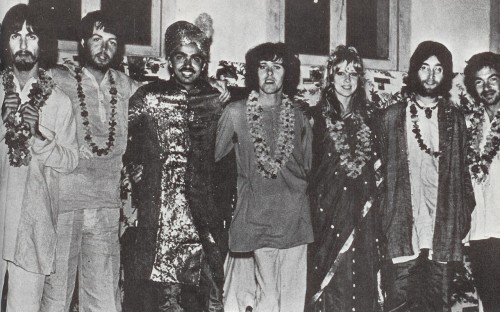
www.vulture.com
Donovan on the Time He Helped Write a Beatles Classic and Then Watched John Lennon Chase a Paparazzo Into the Jungle
By Donovan as told to David Marchese
Photo: Keystone Features/Getty Images
On December 2, at Music Without Borders' annual John Lennon Tribute concert, folk-rock singer and hippy icon Donovan will be honored with the Real Love award, which recognizes significant bodies of work as well as social impact. (Donovan will also be performing at the tribute.) Playwright Eve Ensler and photographer Bob Gruen are former recipients of the award, but none of them ever helped out a Beatle with a song or watched as that same Beatle angrily chased after a sneaky photographer.
In advance of the concert, we asked Donovan — whose Open Road is overdue for rediscovery, by the way — to tell us a story about Lennon, and here (lightly edited for clarity) in true mystical, optimistic, Beatles-y glory, is what he said:

As you may know, in 1968 I traveled with the Beatles to an ashram in Rishikesh, India, to study transcendental meditation with the Maharishi Mahesh Yogi. It was quite an experience, one John was very excited about, especially the idea that humans exist on three levels of consciousness: waking, dreaming, and sleeping. All the ancient books of course say that there is a fourth level of consciousness and the only way you can approach it is through meditation, which involves a mantra, which is merely a nonsense word that when repeated leads you away from being attached to thought forms and into the realm of pure consciousness, pure thought. Quite simple, really. And this is nothing to do with LSD, mind you. LSD started to become a problem after all the dealers got involved. The sacred plants, mushrooms and such, I found more productive. You probably know this, but Santa Claus comes from a Siberian tradition whereby the shamans would visit the tribal societies of northern Europe once a year, bringing drums and music and magical mushrooms to the tribes as well as the gift of understanding that the answers to all the great questions lie within. Anyway, when John learned about all this, meditation that is, he said, "Inside the mind is an extraordinary place? This is like a bloody science-fiction movie!" So we went to India to learn more. Once we got there, we plunged, very bravely I must say, into our own minds, to a place beyond thought, and answers to questions about life started arising in the form of songs — songs that could bring people together.
At the Maharishi's ashram a very touching experience happened: John asked me to teach him some new chord structures and how to do finger-style guitar. You know, I knew in 1965 when we met that he and I were similar. John and Paul [McCartney] are Liverpool Irish and I'm Glasgow Irish, and that means we were both in the ancient Gaelic tradition of bards and shamans and troubadours, poets of the very highest order, those with the goal of delivering peace and wisdom. So we had a similar outlook — I found myself very easily able to contribute lines to "Yellow Submarine" for example. I suggested the lyrics "Sky of blue and sea of green" and they worked quite nicely. The point is that the Beatles and I were drawn together, and the time I spent in India teaching him as a student, away from fame and fortune, was wonderful. He was a good learner, he learned in two days what I'd learned in three. These flamenco, blues, and jazz chord forms that I taught him, and the finger-style technique, developed into some of the extraordinary songs on The White Album.
As John was in this period of tuition with me, he told me he wanted to write a song about his mother. He said, "Donovan, you're the king of children's songs. Can you help me?" I asked him what exactly it was that he wanted to do. He said, "I want to write a song about the childhood that I never really had with my mother." He asked me to help him with the images that he could use in lyrics for a song about this subject. So I said, "Well, when you think of the song, where do you imagine yourself?" And John said, "I'm at a beach and I'm holding hands with my mother and we're walking together." And I helped him with a couple of lines, "Seashell eyes / windy smile" — for the Lewis Carroll, Alice in Wonderland feel that John loved so much. And the song, which you may know, is the amazing "Julia." I haven't told many people that before.

Here's something else from that same trip, something that shows a different side of John that I haven't spoken about much. No press managed to break into the ashram when we were all there. An amazing army of media were parked nearby for three days, until the Maharishi asked the local army to escort them out, but a few of them managed to stick around. So one morning, John was washing his hair in the jungle after breakfast — I was sitting on the patio of his little bungalow — and John turned around and saw a paparazzo trying to catch a photograph. Yes, a photograph of the famous John Lennon in the jungle. John, people forget this, but John had that Liverpool's sailor swagger side to him. He wasn't just the icon people think of now. So John saw this paparazzo and immediately started chasing him through the jungle, cursing and yelling at him. I'd never seen someone so scared in my life as that photographer. John caught him and threw him over the fence of the ashram. That John, we could use more people like him. He was one tough nut. I miss him still.

No hay comentarios:
Publicar un comentario